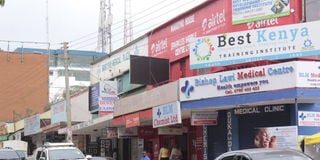Private chemists, clinics surge to fill gap in Meru

Some of the chemists in Meru town.
When Newton Mwirigi was rushed to Meru Teaching and Referral Hospital in mid-July with a deep cut, he hoped to get all the services he needed for a speedy recovery.
All went well, until he presented his drug prescription to the hospital pharmacy. Only half of the medicines he needed were available at the county’s top public hospital.
“I spent more than Sh3,000 on buying drugs from chemists near the hospital as well as in town. It was really expensive,” Mr Mwirigi says.
Mr Mwirigi is among thousands of patients who must bear the cost of drugs and non-pharmaceuticals whenever they visit public hospitals, leading to thriving private chemists and clinics.
There are 282 private medical clinics in Meru County, accounting for 50 percent of all health facilities, said county health records officer Robert Kinoti.
A spot check on private chemists in Meru town indicated there are about 41 premises, with 19 located in the central business district.
New medical facilities have been coming up, adding to the more than 20 existing private hospitals, clinics and medical centres in the town.
Data from the county Health department shows that more than 2.6 million people sought outpatient services in 2021.
Former Health executive Misheck Mutuma in March blamed perennial drug shortages on delays in the disbursement of funds from the National Treasury and challenges in the Kenya Medical Supplies Authority (Kemsa).
Meru spends up to Sh300 million on medicines and non-pharmaceutical supplies every year and this is expected to rise to Sh450 million in a few years.
Kenya National Union of Nurses (Knun) Meru branch chairman Mugambi Bakari blames drug shortages on inefficiencies in the previous administration.

Some of the chemists in Meru town.
“Even today, many public hospitals do not have medicines. In the 2020/2021 financial year, we did not receive any drugs,” Mr Bakari says.
Every hospital is required to order drugs quarterly, with the requisitions made to the county pharmacist via email before the end of the quarter.
Fix problem
“Once we send our orders, the pharmacist consolidates them for purchase. This is where the problem lies. We are hopeful that the current county administration will be able to fix this problem,” Mr Bakari explained.
Kenya Union of Clinical Officers (Kuco) Meru branch secretary Moses Baiyenia called for reforms in the national pharmaceutical supply systems to address the shortages once and for all.
Meru’s acting Health chief officer, Dr Joseph Wahome, observed earlier that “there are far too many chemists and clinics in Meru town’.
“This is partly because of many jobless medics who have to earn a living, as well as challenges that face public hospitals,” Dr Wahome said.
Former Meru governor Kiraitu Murungi had admitted that serious resource challenges were causing shortages of drug and pharmaceutical supplies.
“The challenge we have been facing is delays in delivery of drugs by Kemsa. Delays in release of funds to the counties have also contributed to this problem,” Mr Murungi said.
Without drugs in public hospitals, patients must buy them from private chemists, leading to booming business.
Nine per cent of Kenyans rely on private pharmacies for outpatient care, according to the 2018 Kenya Household Health Expenditure and Utilisation Survey.
The survey, carried out by the Ministry of Health and the Kenya National Bureau of Statistics, found that Meru County had one of the highest per capita out-of-pocket health spending, more than Sh3,000.
“[A] Majority of Kenyans bypass their nearest outpatient health provider because of unavailability of medicines,” the survey states.
There were 167 registered pharmacies in Meru by July 2022, with the majority in Meru and Maua towns, said the Pharmacy and Poisons Board (PPB).
The upper eastern region, which includes Meru, has also been on the PPB radar for the high number of cases of illegal pharmaceutical practices.
In June this year, about 90 people were arrested in the region for operating illegal pharmacies.
“[The] Board has closed 88 premises based on various offences that contravene Cap 244 Laws of Kenya …,” the PPB said in a statement.
While PPB guidelines for licensing premises require pharmacies to be at least 200 metres apart, this rule is not adhered to.
“The Board shall consider the needs and population size of an area during evaluation of applications for registration of new premises,” the guidelines state.
“A reasonable distance (at least 200 metres) shall be maintained between any two registered premises to discourage unfair competitive trade practices.”
Meru Governor Kawira Mwangaza has vowed to prioritise health services, noting that “lack of healthcare is threatening livelihoods and diseases [are] a source of misery for residents”.
[email protected]





